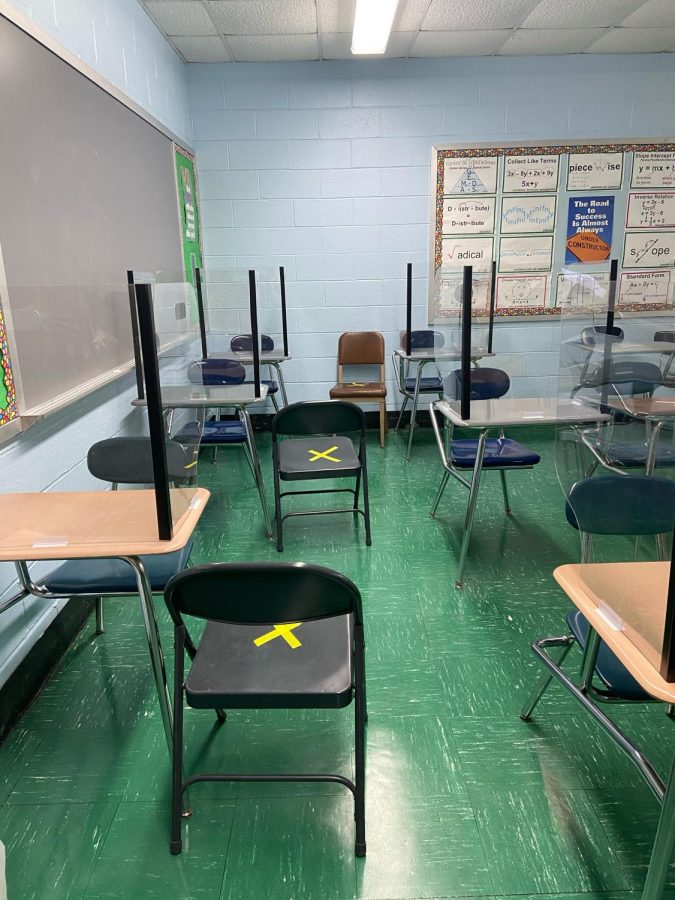First Quarter Review: Testing and Learning in a Hybrid Model
The classrooms of Huntington High School certainly look different than they did last fall (Credit: Talia Addeo)
November 24, 2020
With the end of the first quarter last Friday marking 10 full weeks of students learning in a hybrid model at Huntington High School, it seems time to reflect on how teachers and students alike have adjusted to what is surely the strangest school year in their careers.
Unlike the third and fourth quarters of the 2019-2020 school year, when classes were asynchronous and graded on a pass-fail basis, classes at Huntington have been as near to normal as possible this year, given the context of a global pandemic. Things have surely changed, but classes are taught in real-time according to our usual period system and the fact that we haven’t had to incur a district-wide shutdown is something to celebrate.
Perhaps the greatest changes at Huntington, aside from the addition of plexiglass screens, have been taking place in our grade books. On the surface, not much seems different compared to past years: students are still graded on a 100 point scale, with honors and AP classes receiving extra weighting on a student’s overall average. Yet the division of students and the virtual nature of curricula this year makes the process of assigning and grading tests far more difficult than in the past.
As a result, participation, usually only worth 10-20% of a student’s grade, has been increased to have a greater impact on students’ grades in most courses. This accounts for the inherent shortcomings of remote assessments and encourages students to participate and engage in learning from home. Instead of traditional paper tests, teachers have been looking towards online methods, through platforms such as Google Forms, AP Classroom, and ZipGrade, among others. Despite the admitted complications with collaboration from home, projects and group work have also taken on a bigger role in the classroom, often being counted as assessment grades in an effort to make this year’s learning process more equitable.
Likewise, different subjects require different grading systems. For world language teachers, participation has always accounted for a significant portion of grading. This year, however, highlighting students’ day-to-day progress became a priority.
“We wanted to place more of an emphasis on student daily work and effort and to use smaller alternate forms of assessment in combination with or instead of the traditional end of chapter tests… I hope that going into next quarter we will continue to assess in this manner, as I think it gives a better snapshot of where each student’s skills and classwork effort truly are,” said Mrs. Fortunato, Huntington’s Latin teacher.
AP Biology and Science Research teacher Mrs. Beck shared that the science department had also decided to reduce the importance of exam grades this year in favor of a more holistic, participation-based evaluation. “I can only speak for my own classes, but this quarter was a success for my students. I did some simple labs with my classes and had students working in the classroom in Google Meets with students at home so the virtual students would participate in the collection and analysis of data,” she remarked.
While most teachers have considered the changes made during the first quarter to be positive, Huntington students have mixed feelings about online testing, particularly with regards to ethics and integrity. It’s not a secret that testing from home makes cheating easier. The truth of the matter is that there is no way for teachers to know what information students have access to when they’re studying remotely, and enforcing an “honor code” is honestly not enough to ensure that tests are fair for the students who are in class on the day of the test.
Although many students admit to the issues of dishonesty and imbalance that come with online testing, for some, the relaxation of testing culture has proven to be a huge relief. “It highly reduces my test-taking anxiety,” said junior Sarah Berry, “but I have to question why that is. I have all my materials during the test. I think it’s fair as long as the test is open notes for the in-class students as well.”
“I think cheating has definitely been an issue in some of my classes…but also in a lot of my classes I feel like it hasn’t been a huge problem. I have multiple teachers that have done a good job of making tests that are pretty hard to cheat on through requiring writing and open ended questions under a limited time slot,” said senior Ella Siepel.
In the past, memorization has been a major component of classroom assessments, yet in a year where any straightforward answers are a search bar away, teachers have felt the need to reorganize their strategies when making exams. Open notes are only helpful if all of the possible answers can be found in one’s notes. Therefore, questions that call for critical thinking and extrapolation are more likely to reflect a student’s actual depth of knowledge on a subject. The potential for group collaboration on a test is also limited by hard time constraints that require students to be working from bell to bell. In these ways, teachers can learn from their first quarter shortcomings and adjust their teaching style to what is needed in this moment.
To say that testing in a hybrid learning model is always advantageous for students at home would be an oversimplification of the subject. Some students deal with living in distracting households, making it difficult to focus during class periods. Others bear the responsibility of caring for younger siblings during class, and still others struggle with attaining stable internet connection when studying from home. In this sense, test-taking remotely is beneficial for those who have the privilege of a quiet environment and internet resources, but is hugely disadvantageous for those who do not. Where school is a neutral test-taking setting, home testing can be impacted by an array of factors that are largely out of our control.
Yet the show must go on, and while we can’t erase grades entirely or return back to fully in-person instruction in the near future, Huntington teachers and administrators can make an active effort to support students and listen to feedback on what is working and what isn’t.

